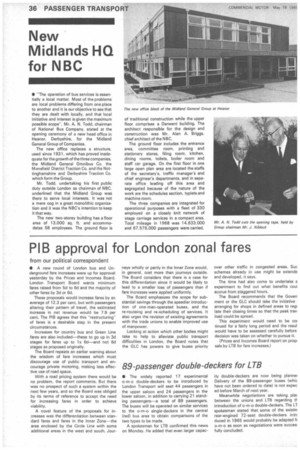PI B approval for London zonal fares
Page 38

If you've noticed an error in this article please click here to report it so we can fix it.
from our political correspondent
• A new round of London bus and Underground fare increases were up for approval yesterday by the Prices and Incomes Board, London Transport Board wants minimum fares raised from 5d to 6d and the majority of other fares by 3d or 6d.
These proposals would increase fares by an average of 12.3 per cent, but with passengers altering their pattern of travel, the estimated increase in net revenue would be 7.9 per cent. The PI B agrees that this "restructuring" of fares is a desirable step in the present circumstances.
Increases for country bus and Green Line fares are also included—these to go up in 3d stages for fares up to 1s 6d—and not 6c1 stages as proposed originally.
The Board repeats an earlier warning about the wisdom of fare increases which must discourage use of public transport and encourage private motoring, making less effective use of road space.
With a road pricing system there would be no problem, the report comments. But there was no prospect of such a system within the next few years, and so the Board was obliged by its terms of reference to accept the need for increasing fares in order to achieve viability.
A novel feature of the proposals for increases was the differentiation between standard fares and fares in the Inner Zone—the area enclosed by the Circle Line with some additional areas in the west and south. Jour
neys wholly or partly in the Inner Zone would, in general, cost more than journeys outside, The Board considers that there is a case for this differentiation since it would be likely to lead to a smaller loss of passengers than if fare increases were applied uniformly.
The Board emphasizes the scope for substantial savings through the speedier introduction of one-man-operated buses, and the re-routeirig and re-scheduling of services. It also urges the revision of existing agreements with the trade unions to enable improved use of manpower.
Looking at action which other bodies might take to help to alleviate public transport difficulties in London, the Board notes that the GLC has powers to give buses priority over other traffic in congested areas. Suc schemes already in use might be extende and developed, it says.
The time had also come to undertake a experiment to find out what benefits coul accrue from staggered hours.
The Board recommends that the Goverr ment or the GLC should take the initiative arranging for shops in defined areas to regt late their closing times so that the peak tray load could be spread.
This experiment would need to be col tinued for a fairly long period and the resul would have to be assessed carefully before decision was taken on whether to pursue it.
IPrices and Incomes Board report on prop' sale by LTB for fare increases.)






















































































































